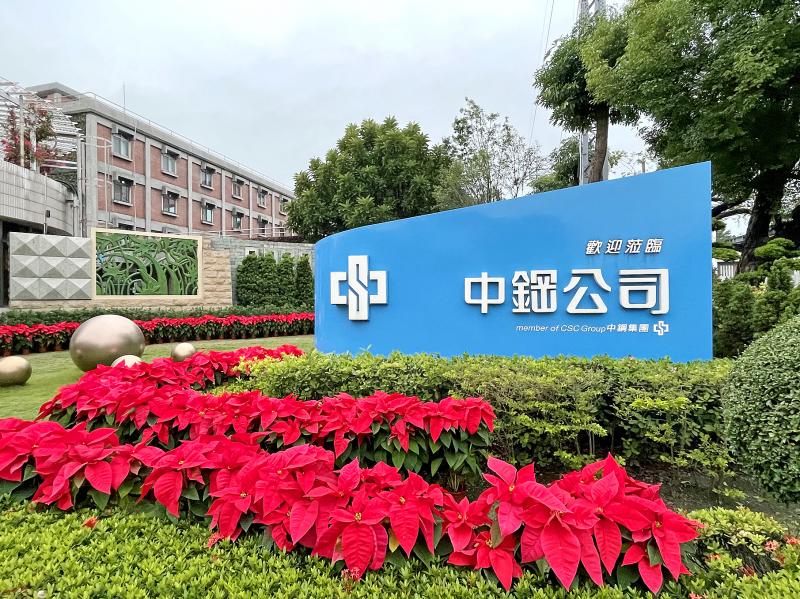China Steel Corp (中鋼), the nation’s largest steelmaker, yesterday said it would cut domestic steel prices by 2.1 percent on average for delivery next month in response to a brief slowdown in steel demand and to help customers mitigate mounting manufacturing costs caused by geopolitical issues.
However, the company said it expects steel demand to pick up in the second half of the year, benefiting from infrastructure programs in China, as lockdowns there could gradually be lifted later this year, as well as post-war reconstruction projects, if Russia’s war in Ukraine stabilizes.
The Kaohsiung-based company’s move matches its Chinese counterparts’ recent downward price adjustments, it said in a statement.

Photo: CNA
China’s Baowu Steel Group Croup Ltd (寶武鋼鐵) and Angang Steel Co (鞍山鋼鐵) lowered their steel prices by up to 200 yuan (US$29.45) per tonne, as demand in Asia plunged during the rainy season and in the month of Ramadan, China Steel said.
Formosa Ha Tinh Steel Corp (台塑河靜鋼廠) in Vietnam is likely to follow suit, it added.
The World Steel Association recently trimmed its forecast for global steel demand this year to an annual increase of 0.4 percent, or 1.84 billion tonnes, down from an earlier estimate of 2.2 percent growth, China Steel said.
As a result, the steelmaker said it is slashing prices by NT$300 to NT$500 per tonne for steels used in a wide range of areas from construction to computers and vehicles.
However, the price of hot-rolled steel coils would remain unchanged, given robust demand for American Petroleum Institute steel pipes for oil and gasoline transmission systems, it said.
As European nations plan to stop importing oil from Russia because of its invasion of Ukraine, demand for US shale oil may climb, leading to increased demand for oil transmission pipes, China Steel said.
“The company decided to adopt a stable pricing strategy, considering that local downstream steel companies are facing ... high commodity costs due to geopolitical tensions. Besides, the COVID-19 pandemic has upended global supply chains and propped up logistics costs,” China Steel said.
“To enhance customers’ competitiveness, the company decided to cut steel prices,” it added.
Based on China Steel’s price adjustment plan the price of hot-rolled plates, hot-rolled coils and cold-rolled coils would drop by NT$500 per tonne. The price of hot-dipped zinc-galvanized steel coils used in construction and baking finish would also fall by NT$500 per tonne.
The price of galvanized steel used in home appliances and computers, and electrical steel rolls would decline by NT$300 per tonne.

Intel Corp chief executive officer Lip-Bu Tan (陳立武) is expected to meet with Taiwanese suppliers next month in conjunction with the opening of the Computex Taipei trade show, supply chain sources said on Monday. The visit, the first for Tan to Taiwan since assuming his new post last month, would be aimed at enhancing Intel’s ties with suppliers in Taiwan as he attempts to help turn around the struggling US chipmaker, the sources said. Tan is to hold a banquet to celebrate Intel’s 40-year presence in Taiwan before Computex opens on May 20 and invite dozens of Taiwanese suppliers to exchange views

Application-specific integrated circuit designer Faraday Technology Corp (智原) yesterday said that although revenue this quarter would decline 30 percent from last quarter, it retained its full-year forecast of revenue growth of 100 percent. The company attributed the quarterly drop to a slowdown in customers’ production of chips using Faraday’s advanced packaging technology. The company is still confident about its revenue growth this year, given its strong “design-win” — or the projects it won to help customers design their chips, Faraday president Steve Wang (王國雍) told an online earnings conference. “The design-win this year is better than we expected. We believe we will win

Quanta Computer Inc (廣達) chairman Barry Lam (林百里) is expected to share his views about the artificial intelligence (AI) industry’s prospects during his speech at the company’s 37th anniversary ceremony, as AI servers have become a new growth engine for the equipment manufacturing service provider. Lam’s speech is much anticipated, as Quanta has risen as one of the world’s major AI server suppliers. The company reported a 30 percent year-on-year growth in consolidated revenue to NT$1.41 trillion (US$43.35 billion) last year, thanks to fast-growing demand for servers, especially those with AI capabilities. The company told investors in November last year that

Power supply and electronic components maker Delta Electronics Inc (台達電) yesterday said it plans to ship its new 1 megawatt charging systems for electric trucks and buses in the first half of next year at the earliest. The new charging piles, which deliver up to 1 megawatt of charging power, are designed for heavy-duty electric vehicles, and support a maximum current of 1,500 amperes and output of 1,250 volts, Delta said in a news release. “If everything goes smoothly, we could begin shipping those new charging systems as early as in the first half of next year,” a company official said. The new